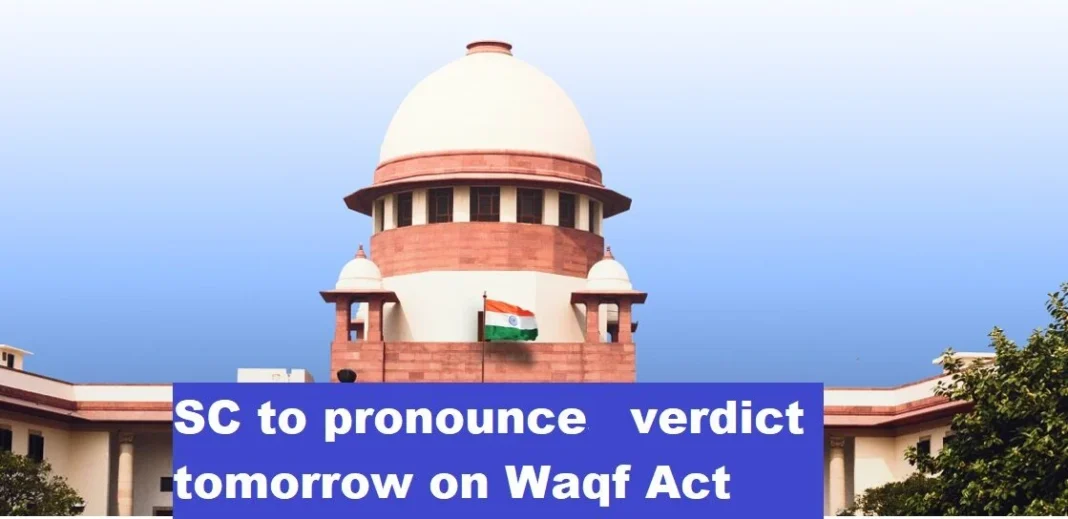Anwarulhaq Baig
New Delhi, Sept.14, 2025 : The country, especially minority community holds its breath as the Supreme Court is all set to pronounce its much-awaited interim order on Monday regarding the contentious Waqf Amendment Act 2025. The case, challenging sweeping changes to the Waqf law, has stirred massive political and social reactions across the country, with several top leaders and organizations joining hands in opposition.
A bench led by Chief Justice of India BR Gavai and Justice AG Masih had reserved the verdict back in May after marathon hearings spread over three days. The petitions, filed by influential organisations and leaders including All India Muslim Personal Law Board (AIMPLB), Association for Protection of Civil Rights, Jamiat Ulema-i-Hind President Arshad Madani, Samastha Kerala Jamiatul Ulema, AIMIM MP Asaduddin Owaisi, Delhi AAP MLA Amanatullah Khan, Anjum Kadari, Taiyyab Khan Salmani, Mohammad Shafi, TMC MP Mahua Moitra, Indian Union Muslim League, RJD MP Manoj Kumar Jha, SP MP Zia ur Rehman, Communist Party of India, DMK, and others, challenge provisions that include allowing non-Muslim representation on Waqf Boards, limiting women’s participation, applying the Limitation Act to Waqf disputes, and other controversial changes.
The AIMPLB, a key petitioner in the case, in its rejoinder described the government’s counter-affidavit as “misleading, flawed, and unconstitutional,” and urged the court to stay the Act’s implementation, warning that it threatens Muslim rights and autonomy.
The Board accused the government of manipulating data by inflating waqf property figures from 3.3 lakh in 2024 to 6.65 lakh in 2025, allegedly counting individual structures within a property separately to create a distorted picture. AIMPLB also challenged the government’s reliance on the “essential religious practices” test, calling it outdated and inconsistent with Supreme Court rulings such as Puttaswamy and Navtej Johar, which safeguard fundamental rights under Articles 14, 19, and 21.
The Board raised serious concerns over Section 3C, which grants the government unchecked authority to classify waqf properties as non-waqf if they overlap with government claims. According to AIMPLB, this provision risks land grabs and creates a conflict of interest by allowing state officials to act as judges in their own cause. The amendment’s expansion of the definition of “government property” to include local bodies like panchayats and municipalities, AIMPLB warned, could lead to mass reclassification of waqf lands.
AIMPLB also objected to Section 3D, arguing that it misuses heritage laws to strip historic mosques of their waqf status, threatening religious sites that have stood for centuries. The Board expressed grave concern over the dilution of Muslim representation in waqf boards and councils, asserting that replacing elected leaders with government nominees undermines community autonomy.
The removal of recognition for informal waqf properties—such as mosques and graveyards established through continuous use—was described as a direct attack on longstanding religious practices. Finally, the Board accused the government of pushing the bill through the Joint Parliamentary Committee without proper debate or consultation, thereby disregarding democratic processes.
AIMPLB insisted that these amendments dismantle a 125-year-old legal framework and violate constitutional rights, urging the Supreme Court to halt the implementation of the Act and safeguard the interests of the Muslim community.
AIMPLB maintained sthat the amendments dismantle a century-old legal framework and violate constitutional guarantees, urging the court to intervene and stay the Act.
The SC had earlier granted interim relief by agreeing not to de-notify existing waqfs or alter their status and by assuring that non-Muslims would not be appointed to State Waqf Boards and the Central Waqf Council during the pendency of the case.
Now, AIMPLB President Maulana Khalid Saifullah Rahmani issued a passionate appeal to the nation’s Muslims. In his statement, he said, “Supreme Court is set to announce its verdict on September 15 regarding the Waqf Amendment Act 2025. This is a critical and defining moment. As you are aware, the Board has left no stone unturned in this battle—holding rallies, press conferences, black-badge protests, and human chains, while also successfully involving non-Muslim brothers in this movement. Alongside public action, the Board has pursued every legal avenue with the support of the finest advocates in the country. Their compelling arguments have already led the Court to stay at least three provisions for now.”
Maulana Rahmani said, “the final judgment is not just a matter of courts—it is decided by the heavens. Whatever outcome emerges will be by the will of Allah. Therefore, I urge every Muslim, especially the Board’s office bearers, members, and sub-committee members, to offer special prayers from today until September 15. Pray for a verdict in favor of Muslims and in alignment with Shariah. Recite durood sharif abundantly, and the supplication ‘Hasbuna Allah wa ni’mal Wakeel’ frequently. Let all mosques unite in prayer. Men, women, elders, and children—everyone should participate wholeheartedly. May Allah accept our efforts and bring forth a righteous verdict that upholds justice and fulfills the faith of our community.”
As the verdict day approaches, the entire country watches closely. Will the Court uphold the integrity of Waqf properties and protect religious rights? Or will it endorse controversial reforms? The coming hours are expected to define the future of Waqf governance and shape the socio-political discourse in India.
Stay tuned as we bring live updates from the Supreme Court, mosques across the country, and reactions from leaders and communities awaiting justice.

